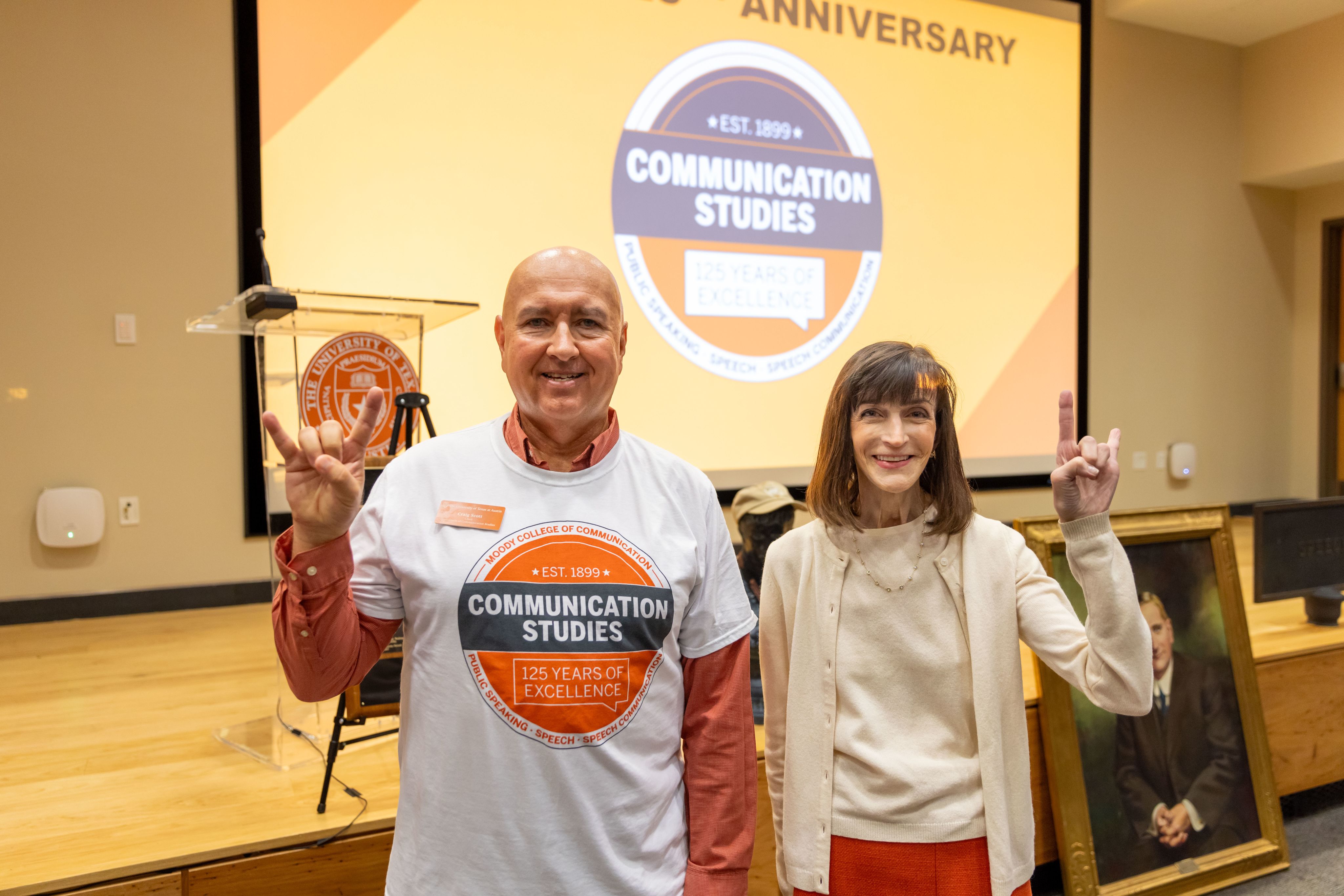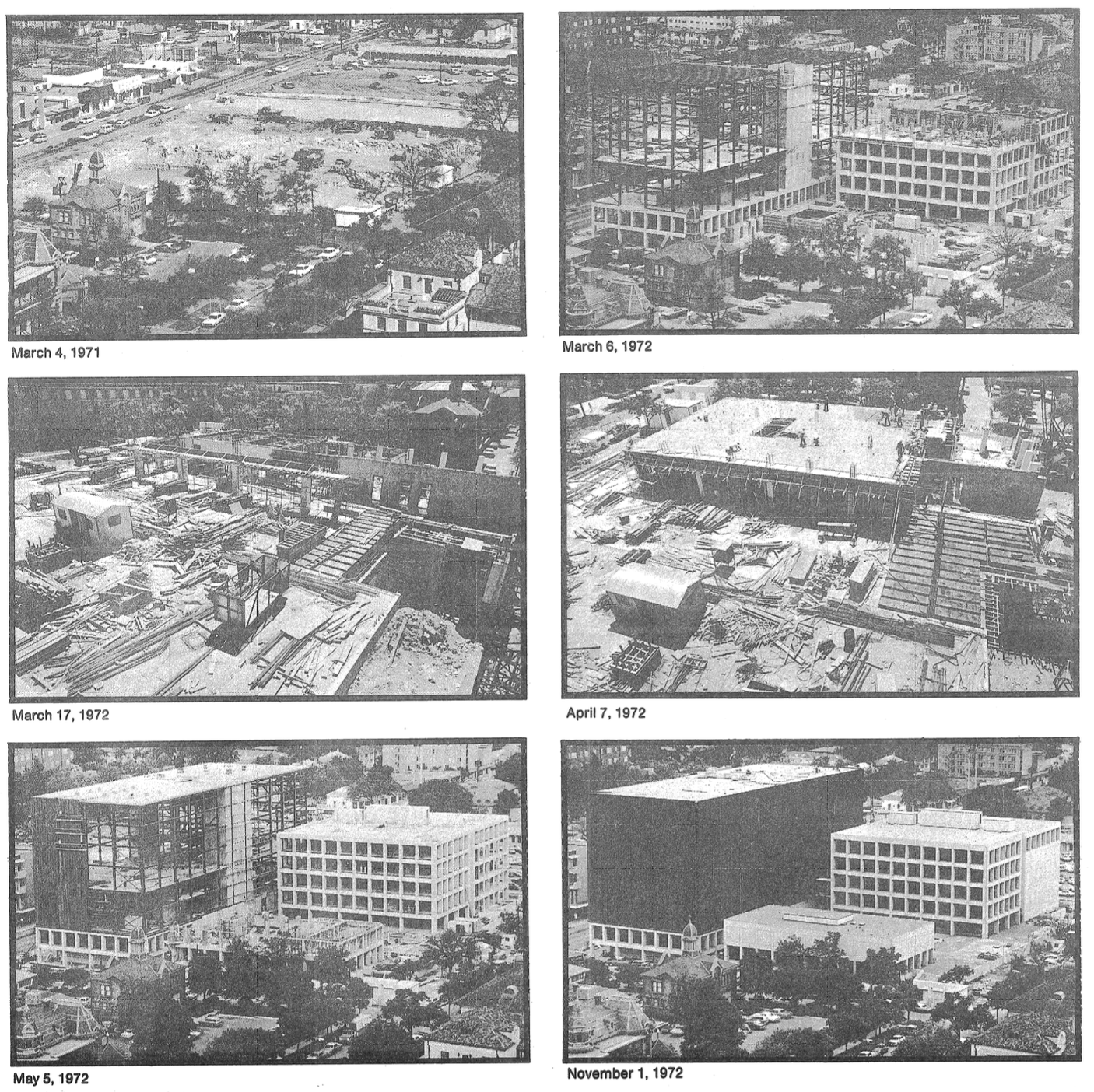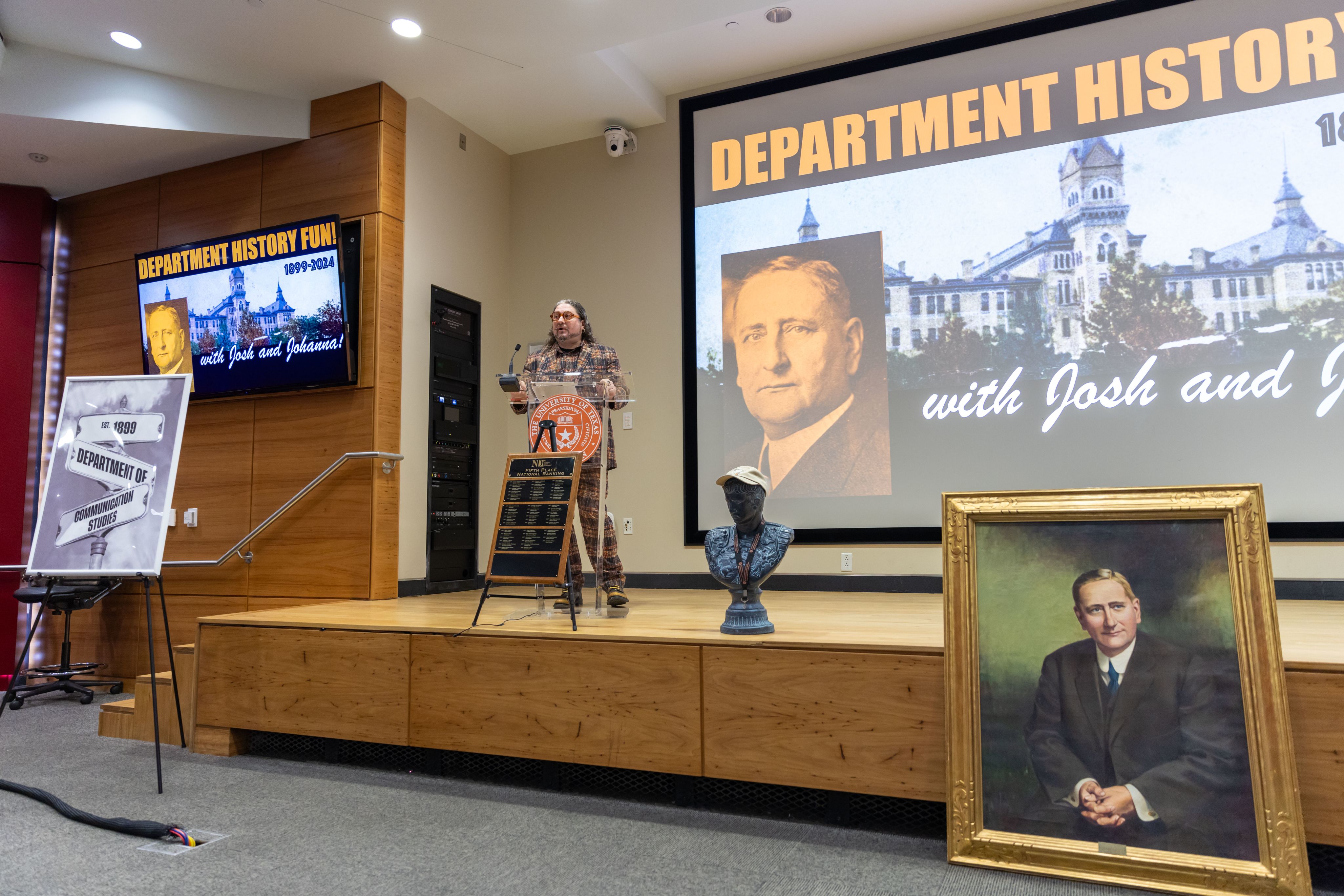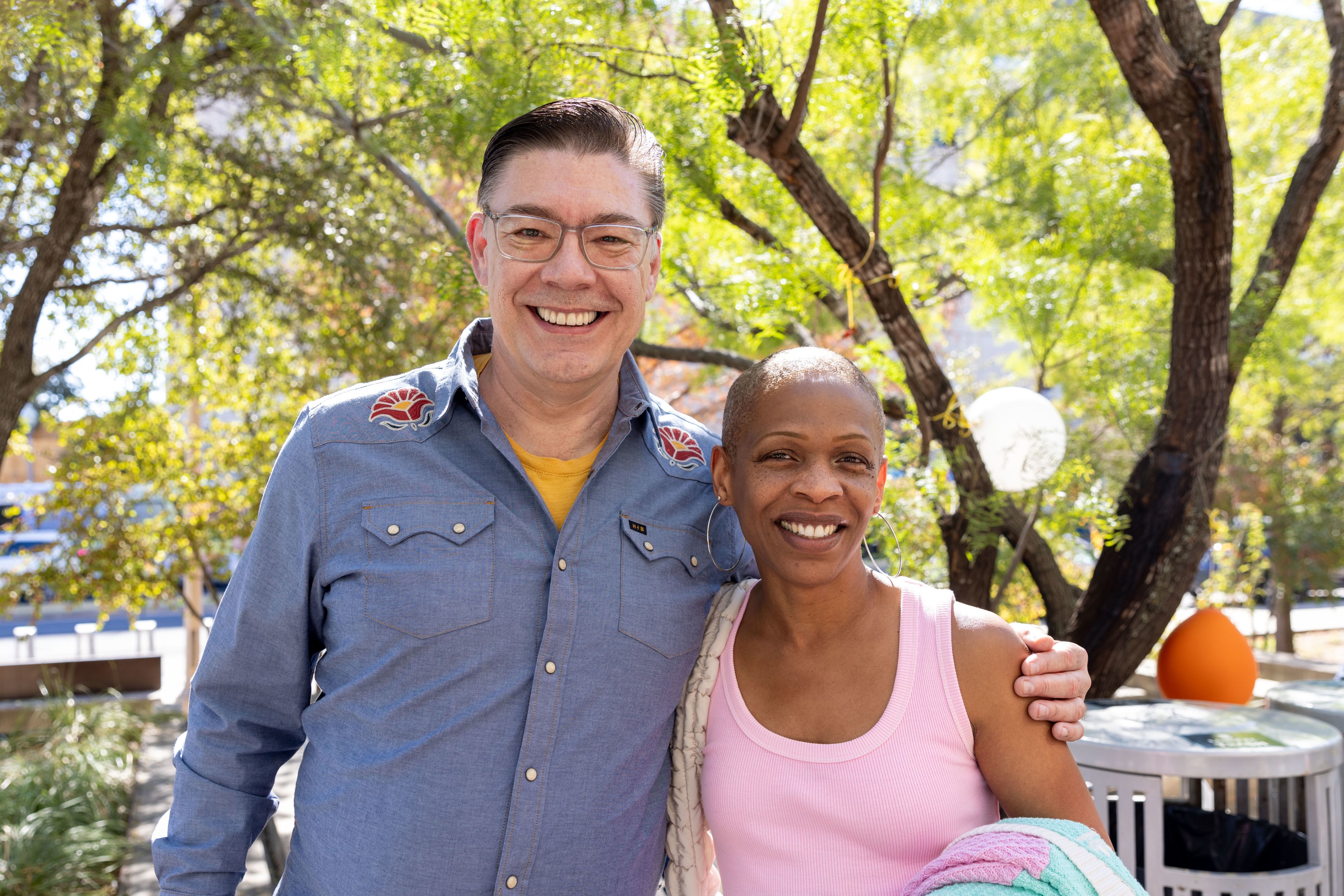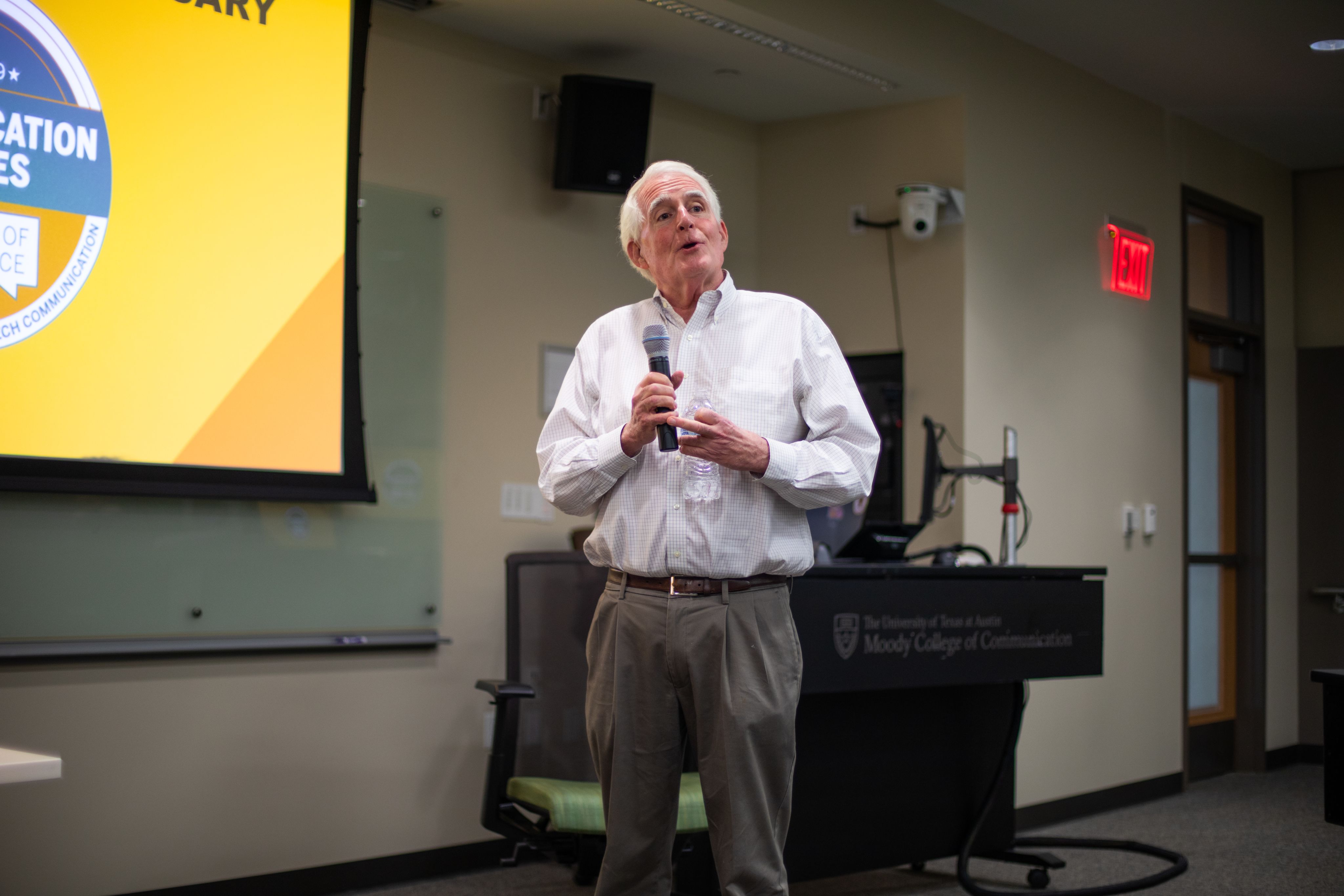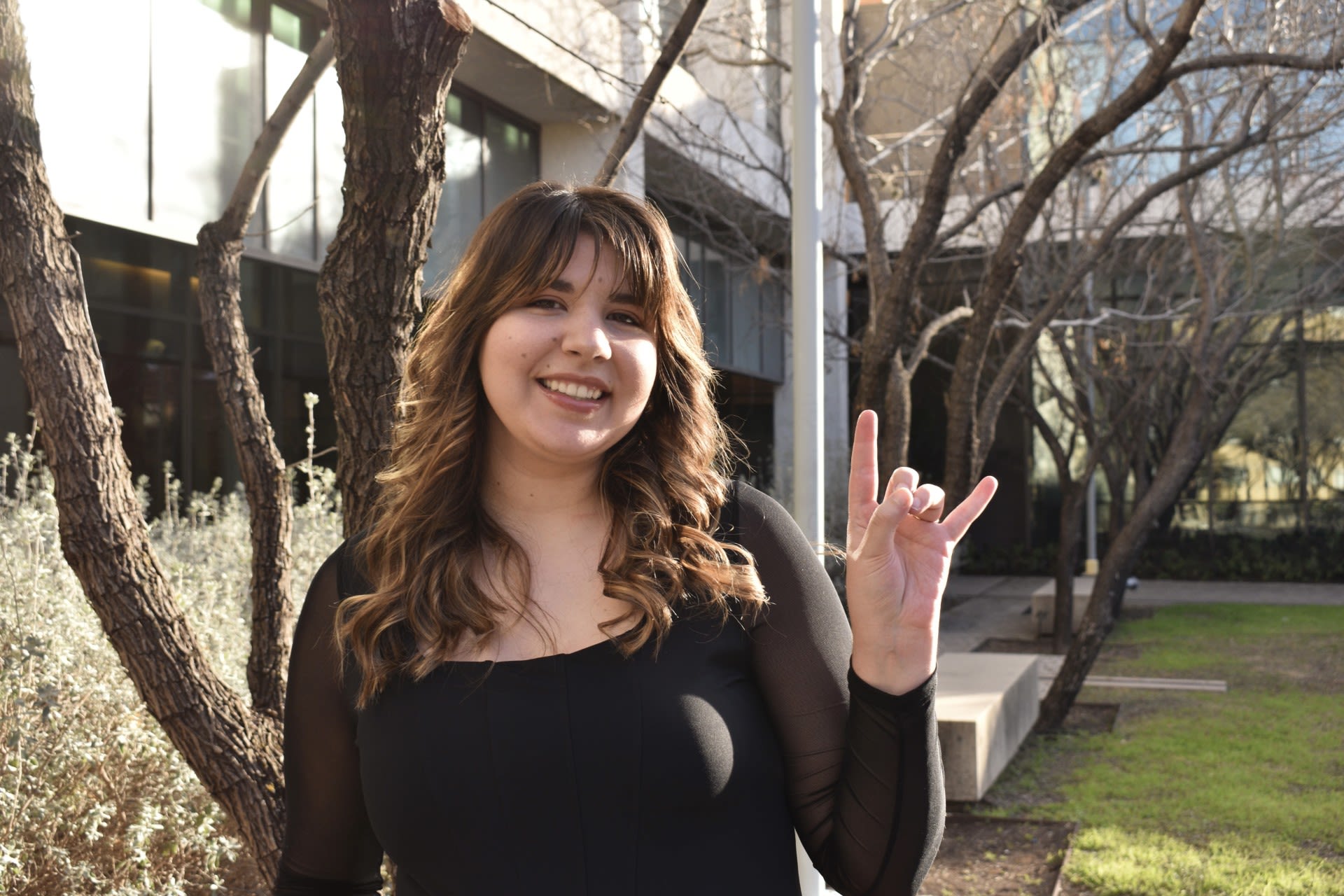125 years of creating the world’s best communicators
125 years of creating the world’s best communicators
Moody College’s Department of Communication Studies celebrates its quasquicentennial
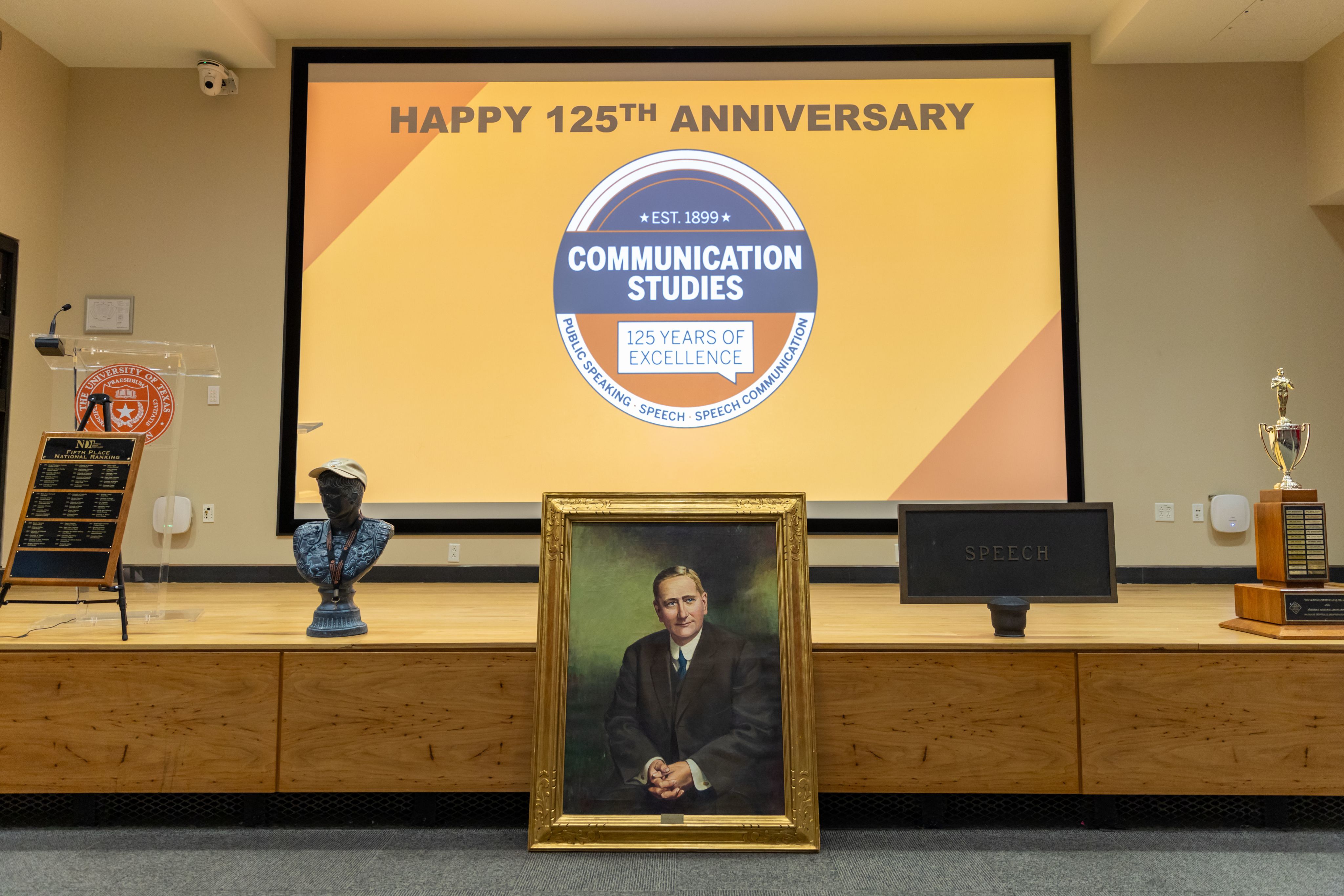
A century and a quarter ago, the ways people communicated looked very different than they do today. The telephone was still a novelty. Newspapers were the primary way people learned about current affairs. A very early precursor to the computer had been developed, a mechanized calculator.
Social media, immersive technology and artificial intelligence would have seemed like science fiction.
Yet with all these changes over time, the fundamentals of good communication have remained the same since ancient Greeks debated issues on the town square — confidence, empathy, active listening, appropriate body language and persuasion. Those fundamentals have shaped communication education at UT since it established its Department of Public Speaking in 1899, the first department in what would become the Moody College of Communication.
The construction of the communications complex in 1971.
The construction of the communications complex in 1971.
This year, the department, now known as the Department of Communication Studies, celebrates its quasquicentennial. In the past 125 years, it has grown from a small wing of the University with just a handful of students to a renowned and highly ranked communication department with more than 750 undergraduate majors and minors and about 70 graduate students. The number of faculty has increased exponentially, and it has transitioned from what was initially a teaching-focused unit to one that prizes research, with five affiliated centers and institutes, and world-class speech and debate teams.
“One thing that hasn’t changed for decades, it’s been a really highly regarded department with a lot of award-winning teachers and researchers,” said Craig Scott, professor and chair of the department. “I think there has been a level of excellence recognized in the University but also in our professional colleagues.”
Professor Joshua Gunn talks about the department's history at its 125th anniversary celebration. Photo by Leticia Rincon
Professor Joshua Gunn talks about the department's history at its 125th anniversary celebration. Photo by Leticia Rincon
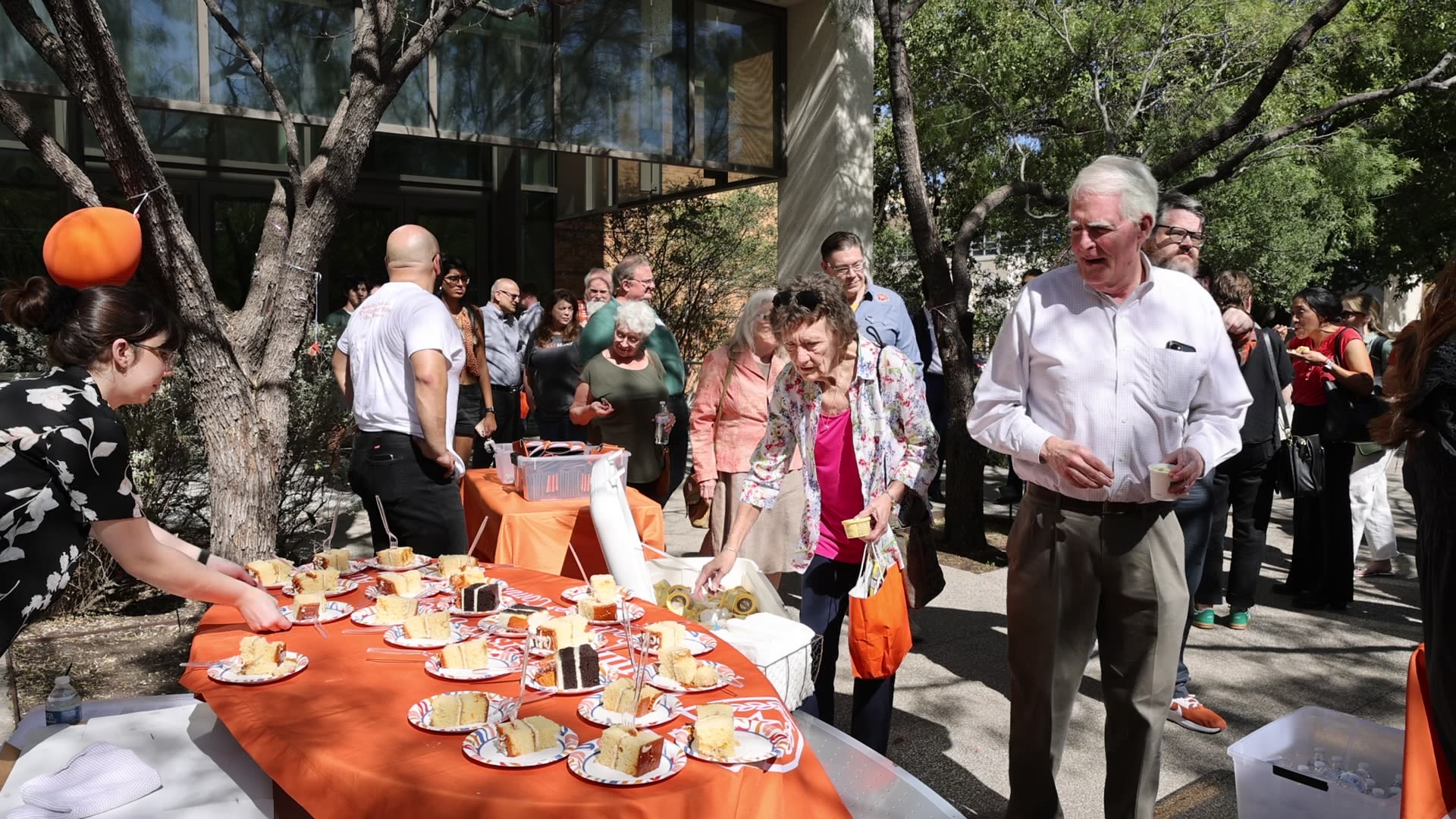
Through the years, the Communication Studies department has been known by many names to reflect the changes in communication and in the University over time, from the Department of Public Speaking to the Department of Speech to the Department of Speech Communication and, now, the Department of Communication Studies.
“The department moved from teaching working-class people how to write to what it is now, a robust and multimodal field that, in our times, is much more applicable to social and civic engagement and the workforce,” said professor Joshua Gunn, who has been studying the history of the department for the past decade. “What isn’t communication now?”
Award-winning communication studies professors Matt McGlone and Dawna Ballard. Photo by Leticia Rincon
Award-winning communication studies professors Matt McGlone and Dawna Ballard. Photo by Leticia Rincon
In October, the department hosted an event to celebrate its 125th anniversary. Former faculty, deans, students and administrators shared their most treasured memories of their time on campus. Numerous alumni were in attendance, including one who graduated in the 1970s.
One word often comes up when they talk about the department — “friendly.” It’s known for its congenial spirit, its welcoming atmosphere and a closeness that is often not realized in large institutions.
"Faculty almost never leave here, and that’s a compliment to the college,” said Communication Studies professor John Daly, who has been with the department for 47 years. “I stayed here because every time I looked, I could never find a place to go that was better than UT.”
“One thing that hasn’t changed for decades, it’s been a really highly regarded department with a lot of award-winning teachers and researchers.”
—Craig Scott
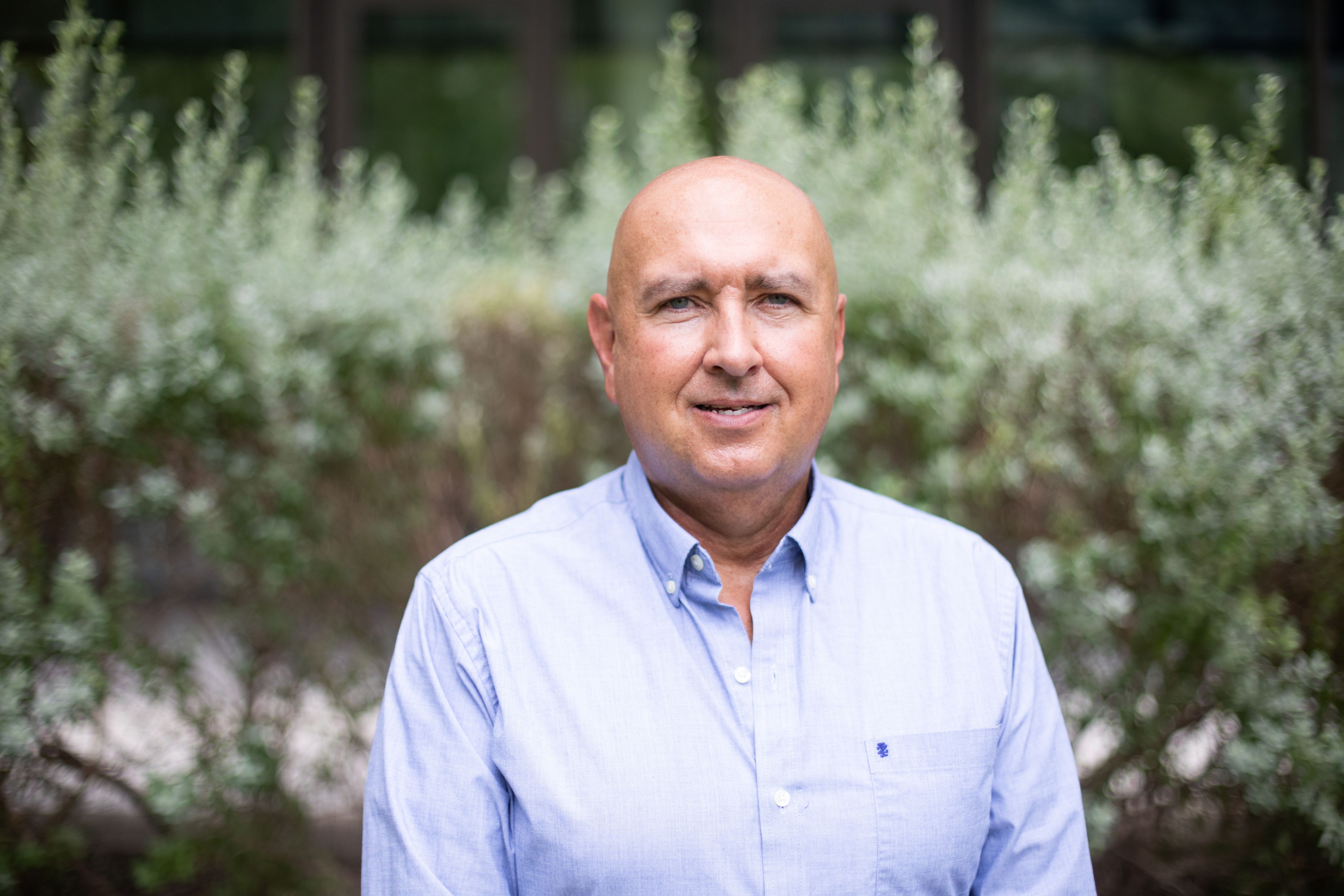
John Daly has been with the Communications Studies department longer than any other faculty member. He came to UT in 1977 just after graduating with his doctorate from Purdue University. At the time, the department was mostly teaching face-to-face communication, public speaking, interviewing, persuasion and how to discuss and solve problems in groups. It provided basic communication classes to students throughout the University because of the benefit to all professions. Communication was known more as a skills-based major, and at the time the department didn’t have a strong research presence. That began to change with the addition of several research-minded faculty in the 1970s, including Daly and professor Rod Hart, who eventually became the college’s dean and remains on the faculty four decades later.
Professor John Daly speaks as part of a panel at the 125th anniversary celebration. Photo by Leticia Rincon
Professor John Daly speaks as part of a panel at the 125th anniversary celebration. Photo by Leticia Rincon
“The department, and ultimately the college, began to develop a much fuller understanding of itself as a national player,” Hart said. “Today, the department's research profile has become as strong as its teaching profile.”
In 1998, what is now the Department of Speech, Language, and Hearing Sciences, previously a part of Communication Studies, split off into its own department. Two years later, Hart founded the Annette Strauss Institute for Civic Life, to encourage civic and political engagement. Later, other interdisciplinary research centers were established by department faculty, including the Center for Health Communication and Center for Media Engagement.
Communication Studies researchers examine every aspect of today’s communication landscape. Faculty and graduate students ask important questions and uncover new knowledge about how parents interact with their children, how doctors talk to their patients, how to keep a sense of community while working virtually, and even how people communicate with robots — which on its face may seem outside the scope of Communication Studies but is in fact crucial to scientists who are developing the newest technologies.
With these questions in mind, the department is now garnering significant grants from the National Science Foundation, the U.S. Department of Education, the U.S. Department of Energy and the National Institutes of Health.
“I think the way we research and respond to an ever-changing world is what makes us special,” said Linley Brown, who graduated in May. “The department trains us to not only keep up with the pace of change but also to thoughtfully contribute to shaping the future.”
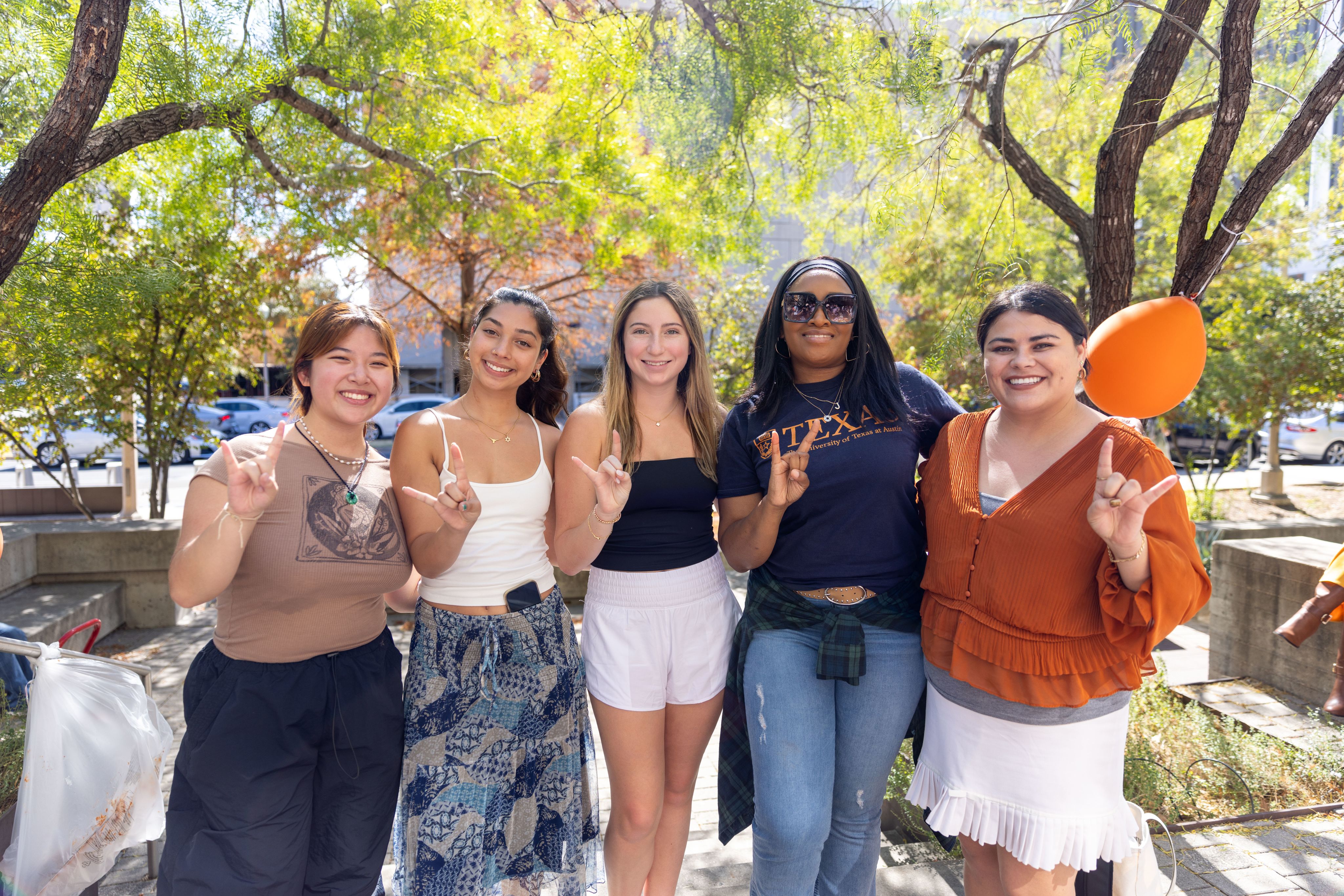
Today, undergraduate communication studies students can choose from one of five tracks that align with their interests: human relations communication; corporate communication; political communication; global and intercultural communication; and strategic and risk communication. They learn crucial skills, such as how to make presentations, resolve conflicts, build sales relationships, and explore communication in a variety of contexts, from environmental and health communication to virtual work, development and philanthropy, civic participation and more, preparing them for an endless number of careers.
Recent graduate Linley Brown
Recent graduate Linley Brown
Recent graduates have taken jobs in marketing, sales, human resources, health care advising, conflict mediation and counseling, advocacy, political campaign management, lobbying, speechwriting, risk analysis, digital media strategy, event planning and more.
“Moody sharpened my writing skills and taught me to think critically about what I say and how I say it. This enables me to craft impactful, persuasive communications that truly resonate with my clients' diverse audiences,” said Devon Chase Whitsel, who graduated this year and now works as a project assistant in the public affairs department at APCO Worldwide, the fifth-largest communications firm in the world. “I had the privilege of learning from some of the best professors in the world. They not only taught me the power of words but also instilled in me a deep belief that I have the capacity to change the world. Every day, I carry that optimism and sense of purpose with me.”
“Moody sharpened my writing skills and taught me to think critically about what I say and how I say it. This enables me to craft impactful, persuasive communications that truly resonate with my clients' diverse audiences.”
—Devon Chase Whitsel
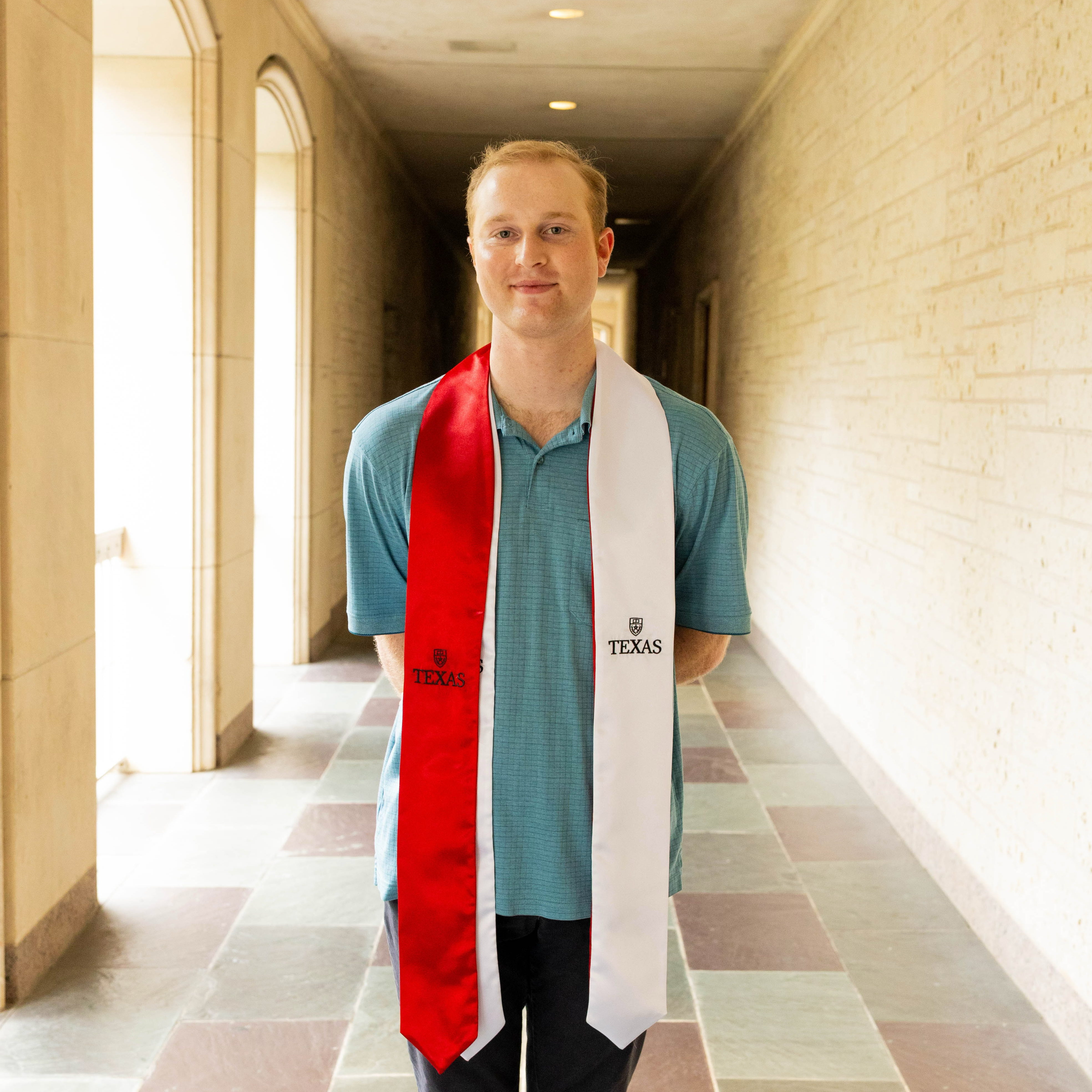
Today, many Communication Studies graduates go on to teach at some of the best universities in the world — or even return to Moody College to carry on its tradition of excellence.
Jenifer Sarver graduated with her communication studies degree in 1999. As a student, she focused on political communication and was the Communication Council president her senior year. After graduation she moved to Washington — two days after 9/11 — and handed out her resume to offices across the district. It wasn’t long before she got a job as a speechwriter for then-Sen. Kay Bailey Hutchison, which Sarver credits to being both a woman and a UT grad.
“Being a Longhorn was pivotal in every job after that,” she said. “Going to UT radically changed my life.”
Sarver always expressed interest in coming back to the University to teach, so when a job opened up, it was an easy yes.
The University she returned to in 2023 was extremely different.
“I didn’t even have a cellphone when I graduated. The world has changed so rapidly,” she said. “However, the fundamental principles of effective communication are the same, and what I learned sitting in those same chairs is relevant every day. How to expertly convey a compelling message to your audience is the fundamental thing we teach in CMS, whether you are speaking with a bullhorn as a political candidate or creating a TikTok video. The channels may have changed, but the fundamentals are the same.”
“The fundamental principles of effective communication are the same, and what I learned sitting in those same chairs is relevant every day. How to expertly convey a compelling message to your audience is the fundamental thing we teach in CMS, whether you are speaking with a bullhorn as a political candidate or creating a TikTok video.”
—Jenifer Sarver
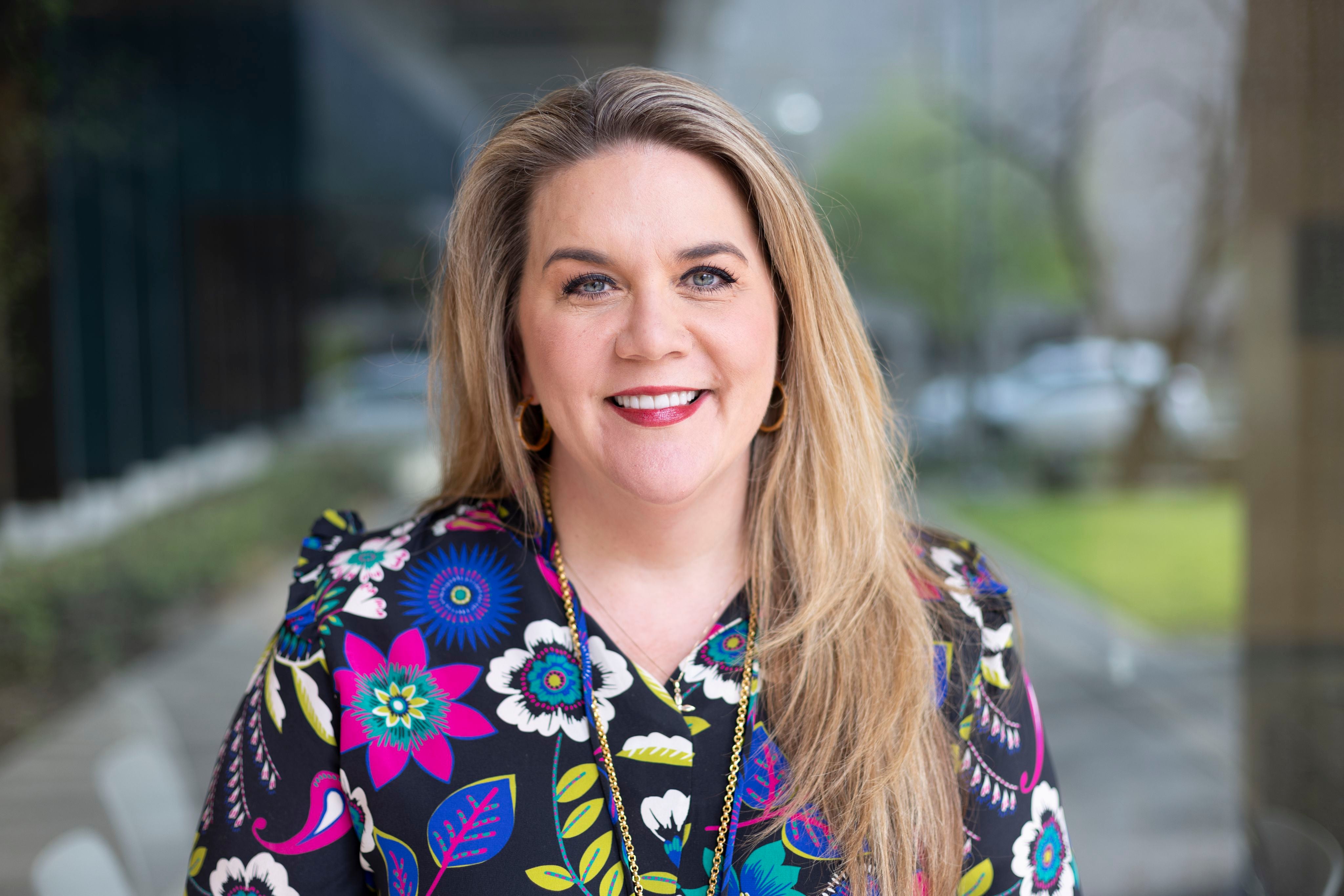
Because of the rapid advances in AI, the department will have to continue to undergo massive transformations in ways that are yet to be seen.
“I hope the department continues to grow, that it gets even better than it is right now,” Daly said. “I hope we get to expose more students to what we do, that we can continue to hire the best faculty and keep the tradition of deep scholarship that changes the world. We have a long history, a good history. Anyone who goes to UT knows the importance of communication as an academic study area, and I hope that continues.”
Currently, the Department of Communication Studies is fundraising to support its next 125 years, to continue its mission of fostering ethical and effective communication by training the next generation of students.
“I think it’s important to celebrate our milestones, to look back at where we have been and the things that helped get us where we are today,” Scott said. “Being a good orator was a very powerful form of communication in the absence of many other media. It is still important today, but it is one of many things. I think our department has really embraced communication changes and evolved to be responsive to what the public needs and how it can help create citizens and future leaders who are good communicators.”
